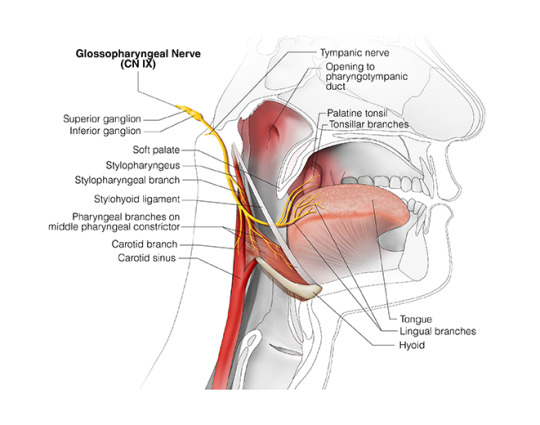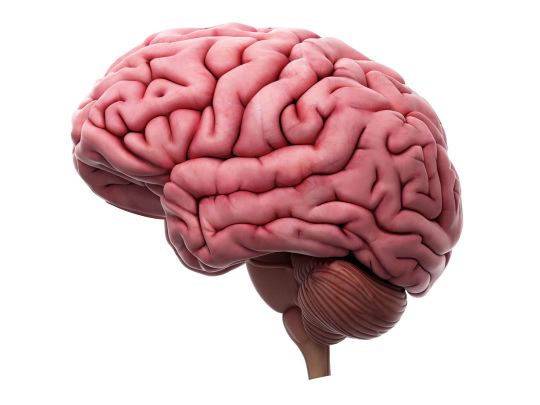#glossopharyngeal neuralgia
Text
it’s aggravating to watch family members struggle with pain with all the waiting for professions like neurologists which can take a year or more to see. And I know you can’t use Google results and a couple of medical journal articles to make a diagnosis by yourself but someone had to start doing something if it’s gonna take a year for them to be seen.
#The ENT suggested a neurologist#He didn’t say what he ruled out and what he suspected that makes him think she should see a neurologist#Her symptoms align with Glossopharyngeal neuralgia#But there’s a lot of other nerves so yeah you’d need a specialist o guess UGH
7 notes
·
View notes
Text
gotta fucking love glossopharyngeal neuralgia!!! its basically my tongue and throat spasming and it for me only causes pain and coughing fits.
god FUCK covid.
2 notes
·
View notes
Text
12 days of Cranial Nerves: Glossopharyngeal nerve

Glossopharyngeal nerve is the ninth cranial nerve that has sensory, motor and parasympathetic components. It ends deep inside of the neck near the back of the throat, amongst other things enabling swallowing, innervating the oropharynx, carotid body and sinus, posterior 1/3 of the tongue, middle ear cavity and Eustachian tube, providing taste sensation to the posterior 1/3 of the tongue, providing parasympathetic innervation to the parotid gland and innervating the stylopharyngeus muscle of the pharynx. Glossopharyngeal nerves allow to feel pain from sore throat or swelling, to detect fluid build up in the middle ear. It decreases the saliva production after one has finished eating and much more.
The glossopharyngeal nerve starts in the medulla of the brain stem, exiting the skull via jugular foramen, travelling down the neck along the jugular vein and going behind the styloid process, a pointy bone in the skull below the ear. It eventually passes the hypoglossal muscle.

What if it isn’t working properly?
Then a person might experience pain during sneezing, chewing, swallowing and other activities, primarily in their throat, back of the tongue or middle ear, which is a symptom of glossopharyngeal neuralgia. Glossopharyngeal nerve palsy results in paralysis of the nerve, where it can no longer serve its functions. It might be a complication of a stroke.
What conditions might affect the glossopharyngeal nerve?
Traumas and injuries may affect the glossopharyngeal nerve, as well as certain tumours.
#12 days of cranial nerves#neuroscience#science#medicine#premed#pre med#med#doctor#med school#cranial nerves#brain#biology#anatomy
0 notes
Text
Literally fuck male doctors
How many doctors have I seen this year??? Like 5??? And I just saw the fifth one and I picked a woman on purpose and thank GOD because I’m finally getting some goddamn help. I mean okay to be fair she’s only the second neurologist I saw but the difference between her and the dude is night and day. Basically here’s how it went.
Me to each doctor: hi doctor, I’m having these symptoms and also I have occipital neuralgia and here’s why I think that.
Dick doctor: you are young and healthy and there is nothing wrong with you
Lady doc: yes it appears you actually have migraines and yes you are correct about the occipital neuralgia and you also possibly have glossopharyngeal neuralgia and here are all of the things we are going to do to make you feel better oh and also one of our graduates just moved to Georgia so you might be able to see her when you move
AND YET I SUFFERED
ALL BECAUSE THAT DICK DOCTOR WOULDNT EVEN LISTEN TO ME OR ENTERTAIN THAT I KNEW THE PAIN I WAS FEELING
#we are increasing topamax dosage#and getting a muscle relaxer#and some kind of migraine medicine#and occipital nerve blocks#personal#I’m legit so excited for these occipital nerve blocks#I’ve been waiting for these for MONTHS
1 note
·
View note
Text
Glossopharyngeal Neuralgia Secondary to COVID-19: A Case Report - Cureus
Glossopharyngeal neuralgia (GPN) is a painful condition characterized by stabbing pain throughout the glossopharyngeal nerve distribution.
from Google Alert - nerve surgery https://ift.tt/unxSiTA
0 notes
Text
Inflammation In The Pathophysiology Of Neuropathic Pain
More recent work has focused on the search for selective HCN2 blockers (Sartiani et al., 2017) that may abrogate hyperexcitability of DRG neurons without affecting the HCN1 channels that are responsible for controlling cardiac rhythmicity (Tsantoulas et al., 2016). Pharmacological treatments such as carbamazepine, which are known to target Na+ channels, have been used for many years to treat some types of neuropathic pain (Demant et al., 2014), particularly trigeminal neuralgia . Several small-molecule blockers with affinity for Nav1.7, 1.8, or 1.9 have been considered.
Clinical evaluation may reveal some evidence of loss of function, and can include assessment of light touch, the ability to distinguish sharp from dull, the ability to discern temperature, and assessment of vibration. Once a thorough clinical examination is performed, the electrodiagnostic study can be planned. These studies are performed by specially trained neurologist and physiatrists.
Management includes exclusion of underlying causes, good glycaemic control, appropriate lifestyle changes, and the use of gabapentinoids, TCAs, SNRIs and opiates. The generally accepted common cause is compression of the Gasserian ganglion or its branches by a blood vessel. BioNerve Plus Reviews include multiple sclerosis, tumour, trauma or injury, trigeminal autonomic cephalagias, temporal arteritis, migraine or atypical facial pain. Thin-cut MRI is used diagnostically to exclude the need for surgical intervention. Symptoms of TGN include jaw pain that may be aggravated by chewing, swallowing, talking, touch,or by consuming hot or cold food and drink.
Sign up to receive free updates on back pain treatments, research, and doctor-reviewed spine health information. Carbamazepine has proven to be particularly effective against glossopharyngeal neuralgia, post herpetic neuralgia, trigeminal neuralgia, and diabetic neuropathies. Should carbamazepine prove ineffective, it can be replaced with phenytoin. Unlike the other anticonvulsants, valproic acid has found some success in treating migraine headaches.
These second-order changes plausibly explain physical allodynia and are reflected by enhanced sensory thalamic neuronal activity, as supported by data from animal42 and human studies43. Hyperexcitability can also be caused by a loss of γ-aminobutyric acid - releasing inhibitory interneurons that can also switch to exert consequently excitatory actions at spinal levels44. In addition, there are less well-understood functional changes in non-neuronal cells within the spinal cord, such as microglia and astrocytes, which contribute to the development of hypersensitivity45. In addition to altering pain perception, changes in the pain matrix can also alter control of spinal dorsal horn neurons as a result of alterations in descending control mechanisms (Porreca et al., 2002; Ossipov et al., 2010).
Explore Mayo Clinic studies testing new treatments, interventions and tests as a means to prevent, detect, treat or manage this condition. These procedures, which help suppress immune system activity, might benefit people with certain inflammatory conditions. Electrodes placed on the skin deliver a gentle electric current at varying frequencies. TENS should be applied for 30 minutes daily for about a month. Medications containing opioids, such as tramadol or oxycodone , can lead to dependence and addiction, so these drugs generally are not prescribed unless all other treatments fail. Schematic representation of the conditioned pain modulation The conditioned pain modulation paradigm is used in the research setting to assess the change of perceived pain by a test stimulus under the influence of a conditioning stimulus.
#nerve health#nerve pain management#dietary supplement#strengthening the nerves#neuropathy pain#restore your nerve health
1 note
·
View note
Text

0 out of 5 stars. Would not recommend. Doesn't work as advertised. Always hurts. No one can do anything. It won't stop. Constantly malfunctions and glitches. Manufacturer won't refund or replace.
#chronic illness#chronic pain#chronic illness memes#chronic migraine#chronic headaches#chronically ill#chronic migraine memes#hemiplegic migraine#vestibular migraine#ocular migraine#migraine#cluster headaches#headaches#headache#brain pain#trigeminal neuralgia#glossopharyngeal neuralgia#seizures
4K notes
·
View notes
Text
Microvascular decompression for glossopharyngeal neuralgia: a retrospective analysis of 228 cases
Acta Neurochir (2018) 160:117–123
Glossopharyngeal neuralgia (GPN) is an uncommon craniofacial pain syndrome caused by neurovascular conflict. Compared to trigeminal neuralgia or hemifacial spasm, the incidence of GPN was very low. Until now, little is known about the long-term outcome following microvascular decompression (MVD) process.
Methods Between 2006 and 2016, 228 idiopathic GPN patients…
View On WordPress
#Glossopharyngeal nerve#Glossopharyngeal neuralgia#Longtermfollow-up#Microvascular decompression#Surgical technique
0 notes
Text

Apparently it’s disabled people visibility day so uh....hi. I’ m Olivia and I have a nerve condition that I never learned how to spell called glossopharyngeal neuralgia. And I also have some other random illnesses. My body is basically jsut an uno wild card. of you rebloged this that would be cool....
#me#my face#disabled visibility day#maybe this isn’t the tag people are using?#can’t find any other content...
14 notes
·
View notes
Text
Glossopharyngeal Neuralgia Pictures, Symptoms, Causes, Treatment, Surgery
Glossopharyngeal Neuralgia Pictures, Symptoms, Causes, Treatment, Surgery
Learn all about glossopharyngeal neuralgia pictures, symptoms, causes, treatment and surgery. The International Headache Society Guidelines define glossopharyngeal neuralgia as a “severe transient stabbing pain experienced in the ear, base of the tongue, tonsillar fossa, or beneath the base of the jaw”. Glossopharyngeal neuralgia is characterized by a sharp, jabbing pain deep in the throat, or in…
View On WordPress
0 notes
Text
The emerging role of gamma knife radiosurgery in the management of glossopharyngeal neuralgia
Neurosurg Rev (2019) 42:31–38
Glossopharyngeal neuralgia (GPN) represents a rare craniofacial disorder accounting for about 1% of all craniofacial pain syndromes. GPN shares several pathophysiologic and clinical features with the more common trigeminal neuralgia. Medical therapy and microvascular decompression, in case of vascular nerve compression, represented the mainstay of GPN management.…
View On WordPress
0 notes
Text
What Is Neuralgia? What Are Its Types?
Overview
Neuralgia, is a neurological disorder characterized by pinching, burning and stabbing pain, which is often quite severe, in the distribution of nerves, caused due to an irritated or damaged nerve. It can occur in any nerve in the body and usually the cause is one of the following things:
Aging
Underlying disorders such as diabetes and multiple sclerosis
An infection such as shingles or herpes
Neuralgia also refers to pain caused by sciatica and brachial plexopathy
Also read: Stroke Can Strike at any Age – Dr. Ashok Kumar Singh, Sr. Consultant- Neurology, Paras HMRI Hospital, Patna
Types
Neuralgia has three common types, which include:
Post herpetic neuralgia
This type of neuralgia is caused by shingles or herpes and can occur anywhere within the body, anywhere an outbreak of shingles was. The pain can range from mild to severe, and can be intermittent or persistent. It can also last for months or years. But it will always occur along the path of a nerve, so it’s usually isolated to one side of the body.
Trigeminal neuralgia
This type of neuralgia is associated with pain from the trigeminal nerve, which travels from the brain and branches to different parts of the face. It is also one of the most common and well-known type of neuralgias. The pain can be caused by a blood vessel pressing down on the nerve where it meets the brain stem, and can also be caused by multiple sclerosis, injury to the nerve, and some other causes. Trigeminal neuralgia is more common in people older than 50.
Glossopharyngeal neuralgia
This type of neuralgia causes pain in the neck and throat, and is not very common.
Neuralgia is treatable by a neurologist. There are top neurologist doctors present in India in most leading neurosurgery hospitals for neuralgia disorder in every metropolitan city. You can find the best neurologist in Gurgaon and Delhi NCR.
#glossopharyngeal neuralgia#neurosurgery hospitals for neuralgia#best neurologist in Gurgaon#Trigeminal neuralgia#Post herpetic neuralgia#Aging#sciatica#brachial plexopathy#neurological disorder
0 notes
Text
What’s really grinding my gears is that my PCP was very willing to diagnose Glossopharyngeal Neuralgia (I do, unfortunately, fit the criteria to a t.) but was unwilling to do a thing about it other than to call me weird and tell me to take care. Oh, and prescribe meds with really not good side effects, without doing any sort of clinical test to confirm whether I have Glossopharyngeal Neuralgia or possibly just a temporary trapped nerve.
“So how do we confirm it?”
“Well there’s stuff you can check but it pretty much sounds like that’s what you have.”
“pretty much sounds like” are you fucking kidding me? I’ve been presenting to you for over four years with chronic pain and fatigue, but you think me asking to have my thyroid checked is unnecessary, but you’re totally willing to diagnose an acute chronic condition off the cuff based on what it sounds like???
“So...it’s a nerve thing...so do I need to see a neurologist?”
“I mean, if you want to. Otherwise we can try the anti-seizure meds and see what happens.”
“...yea I’m not comfortable with that.”
“Or you can try taking half a Tylenol with 400mg of ibuprofen. That should help.”
First of all, everyone and their dang dog knows NSAIDs don’t combat nerve pain, but she prescribed 400mg of Ibupforen and a whole half a Tylenol for what is possibly a condition that from looking at google, most people wind up having a tiny hole drilled in their skull to relieve the pressure on the nerve or commit suicide from the pain. But yea, sure. 400mg of ibuprofen and half a Tylenol sure sounds like it’s going to cut the mustard on that one. Thanks. Fantastic. Super.
Also, 400mg? Ha ha ha. I take 400mg to get out of bed some days, don’t come at me with that shit.
Anyway. Back in the realms of actually giving a shit, I’m going to look for a neurologist. And possibly call my chiropractor and my dentist. I dunno what he can do, but maybe there’s something he’ll have heard of. Maybe my TMJ is making this worse and there’s something he can do. God I don’t know. I just want this new pain to stop.
359 notes
·
View notes
Text
The reasons behind the sharp throat and ear pain – How to deal with them

The majority of ear and throat infections occur in youngsters. Any discomfort in the sensory organs can be concerning for parents, especially when a toddler is in excruciating pain but is unable to express it. The appropriate medical care from an ENT specialist at the right time might save the child a lot of suffering pain and concern for the parents.
What causes sharp throat and ear pain?
Many times, the common cause is a cold, but you should not jump to conclusions just yet. Many underlying disorders might cause throat irritation and earache. Throat and earache caused by a cold go away in a week. However, if the pain persists, you should schedule an appointment with Dr. Poorva Lunavat, ENT Specialist in Pune
What could be the other potential causes?
There are a variety of illnesses that cause mild to the severe throat and ear pain, in addition to the common cold. Continue reading the blog to learn more about sore throats, nasal allergies, strep throat, ear fullness, and other ENT problems that cause pain.
Inflammation of tonsillitis:
Tonsillitis can affect adults, causing symptoms such as difficulty swallowing and intense pain at the end of the tongue or behind the ears. White patches at the tip of the tongue, fever, headache, poor breath, and a scratchy voice are among the additional symptoms. Getting enough rest, eating healthy, smooth foods with plenty of liquids, utilizing a cool-mist vaporizer, and gargling salt water are just a few ways to get relief quickly.
Strep throat:
Another prevalent bacteria-related illness is strep throat. Strep throat is a frequent infection that affects people of all ages, especially during the winter months or after drinking extremely cold beverages. It’s a painful condition that’s often accompanied by a fever and a squeaky voice. The little red dots on the tongue’s tip make swallowing more difficult. Penicillin and amoxicillin are two of the most commonly prescribed antibiotics for strep throat.
Mononucleosis:
Also known as mono, mononucleosis is an infectious viral disease. The symptoms can last anywhere from a few days to several weeks, and they cause excruciating agony in the ears and throat. Other symptoms include ringing in the ears, ear fullness, muscle discomfort, and a moderate temperature. Because mononucleosis is a viral infection, there is no specific treatment for it. The only way to take care of one is to eat healthily.
Glossopharyngeal neuralgia (GPN):
This disorder, also known as GPN, causes agonizing throat and ear discomfort and is luckily relatively rare. The glossopharyngeal nerve, which connects the head and neck, causes this neuropathic pain. Swallowing cold liquids, intense yawning, coughing, and talking are all common triggers for this nerve’s short and strong pain episodes. If medication fails to cure the disease, the ENT specialist may propose surgery.
Acid reflux:
Acid reflux is a gastro disease in which stomach contents are forced back into the oesophagus, causing heartburn and a lump in the throat. After a large meal or when you try to lie down on your back, the lump may become painful. Consult your gastroenterologist if you have been diagnosed with GERD and are suffering throat pain.
Peritonsillar abscess: Untreated tonsillitis can lead to a peritonsillar abscess. The accumulation of pus and fluids around one of the tonsils causes excruciating agony. The infection affects only one tonsil, resulting in pain on one side. The agony was different from the others, and it necessitated medical attention right now. To diagnose and treat peritonsillar abscesses, doctors use needle aspiration.
Eagle syndrome is an uncommon disorder characterised by problems with the tiny bones of the neck and skull. The person feels a lump in her/his throat, which produces pain when she/he moves her head. Other signs and symptoms include trouble swallowing, ringing in the ears, and neck and facial pain. Surgery is required to fix the problem.
For parents, ear and throat infections in children can be frightening. Learn more about these disorders so you can get the help you need it.
Lunavat Clinic in Pune offers comprehensive treatment for a variety of ear, nose, and throat infections. If you’re experiencing any discomfort in your throat, ear, or nose, make an appointment right once.
0 notes
Text
Trigeminal Neuralgia Helped with Chiropractic - Case Study
After just five days a patient experienced complete relief from Trigeminal Neuralgia. The latest report from his mom states he is still symptom free. When the nervous system is working properly people can function the way they were designed.
A study in the Journal of Upper Cervical Chiropractic Research published on February 23 documents the case of a boy suffering trigeminal and glossopharyngeal neuralgia being helped with chiropractic care. The Mayo Clinic website defines this condition by writing, “Trigeminal neuralgia is a chronic pain condition that affects the trigeminal nerve, which carries sensation from your face to your…

View On WordPress
0 notes
Text
ok i could go into my whole chronic pain story (i did type it out but deleted it) but do any of my followers have any experience with trigeminal neuralgia or glossopharyngeal neuralgia?
0 notes